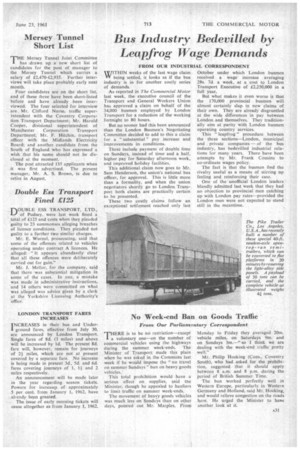Bus Industry Bedevilled by Leapfrog Wage Demands
Page 33

If you've noticed an error in this article please click here to report it so we can fix it.
FROM OUR INDUSTRIAL CORRESPONDENT WITHIN weeks of the last wage claim IN being settled, it looks as if the bus industry is in for another costly series of demands.
As reported in The Commercial Motor last week, the executive council of the Transport and General Workers Union has approved a claim on behalf of the 34,000 busmen employed by London Transport for a reduction of the working fortnight to 80 hours.
But no sooner had this been announced than the London Busmen's Negotiating Committee decided to add to this a claim for a substantial 's pay increase and improvements in conditions.
These include payment of double time on Sundays, instead of time and a half, higher pay for Saturday afternoon work, and improved holiday facilities.
This additional claim now goes to Mr. Sam Henderson, the union's national bus officer, for approval. This is little more than a formality, and when the union negotiators shortly go to London Transport both claims are practically certain to be presented.
These two costly claims follow an exceptional settlement reached only last October under which London busmen received a wage increase averaging 28s. 7d. a week, at a cost to London Transport Executive of £2,250,000 in a full year.
But what makes it even worse is that the 170,000 provincial busmen will almost certainly slap in new claims of their own. They are already disgruntled at the wide differences in pay between London and themselves. They traditionally aim at parity with London busmen operating country services.
This " leapfrog " procedure between the three sections—London, municipal and private companies — of the bus industry, has bedevilled industrial relations for many years. There have been attempts by Mr. Frank Cousins to co-ordinate wages policy.
The fact is that the busmen find the rivalry useful as a means of stirring up feeling and reinforcing their case.
One of the unofficial London leaders blandly admitted last week that they had no objection to provincial men catching up with London pay rates—provided the London men were not expected to stand still in the meantime.




















































































































